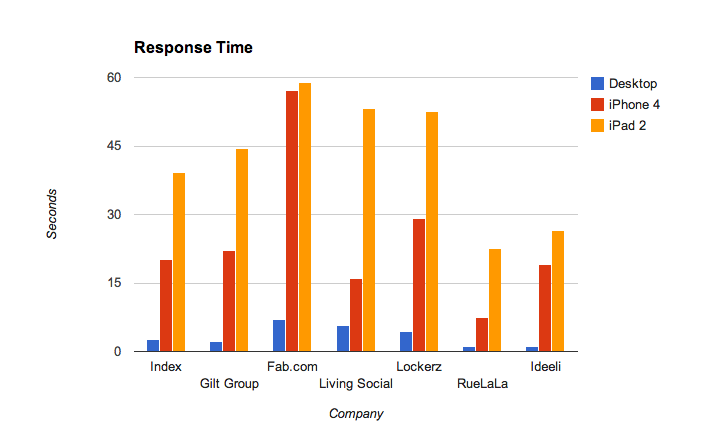 Editor’s note: Keynote Systems’ Startup Shootout Index provides some insight into the three-screen challenge now facing anyone with a web presence. We’ll be bringing you a fresh set of data from Keynote every month. Check out previous Startup Shootout results.
Editor’s note: Keynote Systems’ Startup Shootout Index provides some insight into the three-screen challenge now facing anyone with a web presence. We’ll be bringing you a fresh set of data from Keynote every month. Check out previous Startup Shootout results.
With the holidays upon us, we thought we’d take a look at how ready our index startups are for two great holiday traditions – shopping and travel. Between Black Friday, Cyber Monday, holiday vacations, and winter storms, these sites are about to get a workout.
As part of the Keynote Startup Shootout Monthly Index we track some of the top travel and online retail sites, across desktop, smartphone and tablet devices. We’ve discussed before the impact of this “three screen” world, especially in adapting to mobile. Let’s see if our index startups are ready for the holiday challenge.
The Virtual Shopping Experience
Creating positive online shopping experiences used to be so straightforward: have the right products at the right price, a smooth checkout process, good overall site performance, and the sales will come rolling in. Mobile sites are becoming increasingly popular for shopping and it is important for retailers have a strong mobile presence. But mobile sites present a whole different set of challenges to ensure they look good and function efficiently. The shopper, of course, just expects a consistent level of performance, regardless of device.
Fab.com offers a native app for the mobile visitor, but it is buried at the bottom of the site. Even if a user does manage to find it, it has taken them a while to do so, which slows down the shopping process. Key takeaway? Put that app right up top if you want to get it used.
None of the retail sites offer tablet-specific pages, but some are designed for better performance. The two fastest home pages for tablet users, RueLaLa and Ideeli, load about three times faster than the others on the retail index. Keeping pages lightweight and less complex, whether the page is specifically optimized for tablet users on not, is key to earning their loyalty rather than driving them to frustration.
Beware of the online retailer that fails to provide a mobile or tablet-specific experience. Otherwise, they are loading incredibly large (desktop) pages across a usually much weaker network and screen experience.
Travel-log
As with shoppers, travelers tend to be in transit if they are accessing these sites from their mobile device. If they are on the road, they may have varying degrees of network support – sitting in an airport or station, driving, on a train, or finding themselves in rural locations with limited access.
Again, we see a number of the travel sites delivering a full desktop page when accessed via a tablet. Companies sometimes assume that tablet users have stronger wi-fi connections than mobile users, but this is not always the case.
Tripology, interestingly, has neither a mobile-optimized site nor app, never mind being optimized for tablets.
AirBnB has an iPhone-optimized site, but the loading time is slow. It loads an excessive element count – which means too many http requests. We can offer a couple of best practices here.
- Keep to ten or less HTTP requests. These each involve round trips from the browser to the server which add to a site’s latency. On the AirBnB site, we are currently seeing 47 http requests. That will definitely slow you down.
- Redirections can be painful in the mobile world, and again we’re talking about slowing down the service dramatically. With AirBnB, there are two redirections from the original URL – first from a non-secure to a secure to a secure mobile site. Ironically its front page appears to be a secure site, which is unusual for a home page. Secure pages are usually reserved for transaction areas and credit card/billing-type pages.
- We recommend at most two or three domains for mobile or tablet apps due to the network issues they can have. We saw 12 different domains on AirBnB’s home page, each of which can add a quarter of a second to loading time.
Conclusion
We continue to see tablet-specific sites fall somewhere in between the full desktop experience and the mobile experience. A startup might have the desktop and the mobile covered, but not the tablet. It makes a big difference when it comes to the customer experience.
The holidays will keep pushing the web performance of these retail and travel sites, plus we’ll assume many people will receive new devices which will only increase the demand. Let’s hope 2013 brings “three screen success” to all out Startup Shootout companies.
Aaron Rudger is the senior manager of web & mobile performance and Ken Harker is the mobile evangelist at Keynote Systems.
VentureBeat's mission is to be a digital town square for technical decision-makers to gain knowledge about transformative enterprise technology and transact. Learn More
